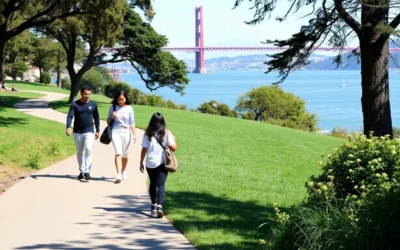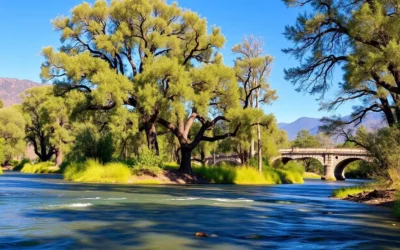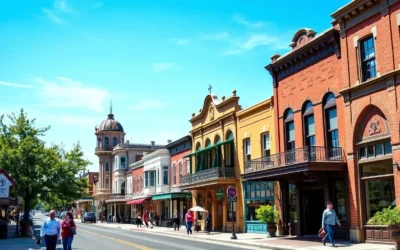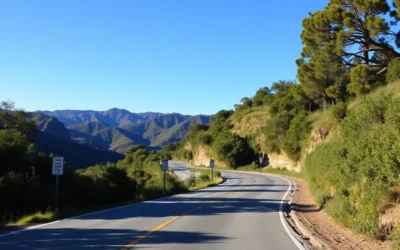Did you know that Devils Postpile’s remarkable hexagonal basalt columns were formed over 100,000 years ago when a lava flow cooled so perfectly that 44.5% of the columns have exactly six sides? This geological masterpiece was nearly destroyed in 1905 when mining interests planned to dynamite it to create a dam, but thanks to conservation efforts led by John Muir, it was protected as a national monument in 1911. Today, this 323-hectare (798-acre) natural wonder stands as one of California’s most fascinating geological treasures.
Getting There & Planning Your Journey
Devils Postpile National Monument is located near Mammoth Lakes in Eastern California’s Sierra Nevada mountains. The monument is relatively remote, which helps preserve its natural beauty but requires some planning to visit.

The most common approach is from the town of Mammoth Lakes. During peak season (mid-June through mid-September), private vehicles are restricted, and visitors must use the mandatory shuttle service that departs from Mammoth Mountain’s Adventure Center. The shuttle costs approximately $15 for adults and makes several stops throughout Reds Meadow Valley.
For those visiting outside shuttle season, you can drive your vehicle directly to the monument when Reds Meadow Road is open, typically from late spring to early fall, weather permitting.
Best Time to Visit Devils Postpile National Monument
The monument is typically open from mid-June through mid-October, with exact dates varying based on snowpack and weather conditions. The operating season is short due to the high elevation (2,200-2,500 m or 7,200-8,200 ft) and heavy winter snowfall.
Recommended Months
- July and August: Peak season with warm days (21-27°C/70-80°F), all facilities open, and full shuttle service
- Late June: Fewer crowds, though some trails may still have snow patches
- September: Beautiful fall colors beginning, cooler temperatures, and fewer visitors
Months to Avoid
- November through May: Monument is typically closed due to snow
- Early June: Often inaccessible or limited access due to snowmelt
- Mid-October: Facilities begin closing, unpredictable weather
Weather can change rapidly in the Sierra Nevada. Even during summer, afternoon thunderstorms are common, so always check the forecast before your visit and bring layers, including a waterproof jacket.

Getting Around Locally
Once you arrive at Devils Postpile National Monument, getting around is primarily done on foot via well-maintained hiking trails. The monument is relatively compact, making it easy to explore in a single day.
| Trail | Distance (One-way) | Difficulty | Highlights |
| Devils Postpile Formation Trail | 0.4 km (0.25 miles) | Easy | Main basalt column formation, top of the formation |
| Rainbow Falls Trail | 4 km (2.5 miles) | Moderate | 101-foot waterfall, rainbow effects on sunny days |
| Minaret Falls Trail | 2.4 km (1.5 miles) | Easy | Scenic waterfall, forest views |
| John Muir/Pacific Crest Trail | Varies | Moderate to Difficult | Long-distance trail connections, wilderness views |
The shuttle bus that brings visitors to the monument makes several stops throughout Reds Meadow Valley, allowing you to access different trailheads without having to hike back to your starting point. This is particularly useful if you want to hike one-way from Devils Postpile to Rainbow Falls and then catch the shuttle at the Rainbow Falls trailhead.
Where to Stay
While Devils Postpile National Monument itself has limited accommodation options, there are several places to stay nearby that provide convenient access to this natural wonder.
Reds Meadow Campground
Located within the monument, this 21-site campground operates on a first-come, first-served basis. It offers basic amenities including bear-proof food storage lockers, but no hookups or showers. Perfect for those wanting to stay closest to the monument.
Mammoth Lakes Accommodations
Just 20 km (13 miles) from the monument, Mammoth Lakes offers a wide range of lodging options from luxury resorts and hotels to vacation rentals and budget-friendly motels. Staying here gives you easy access to the shuttle service.
Backcountry Camping
For experienced hikers, backcountry camping is available in the surrounding Ansel Adams Wilderness. Wilderness permits are required and can be obtained through Inyo National Forest.

Dining & Local Cuisine
Food options within Devils Postpile National Monument are limited, so planning ahead is essential. The Mule House Café at Reds Meadow Resort offers basic meals and snacks during the operating season, but most visitors bring their own food or dine in Mammoth Lakes.

Dining Tips:
- Pack a Picnic: There are several scenic spots perfect for a picnic, including areas near Rainbow Falls
- Bring Plenty of Water: While drinking water is available at the ranger station, it’s wise to bring your own, especially for hiking
- Mammoth Lakes Restaurants: The nearby town offers everything from casual cafés to fine dining establishments featuring Sierra Nevada-inspired cuisine
- Local Specialties: When in the Eastern Sierra region, try fresh trout dishes, which are a local specialty
Remember that all food must be properly stored in bear-proof containers or lockers when visiting the monument. Never leave food unattended, even for a short time.
Attractions, Sightseeing & Activities
Devils Postpile National Monument may be small in size, but it packs in several remarkable natural attractions that make it well worth a visit.

Devils Postpile Formation
The monument’s namesake feature is a remarkable cliff of columnar basalt, formed when a lava flow cooled evenly and slowly less than 100,000 years ago. The columns average 0.6 meters (2 feet) in diameter and many reach heights of 18 meters (60 feet). What makes this formation particularly special is the unusually high percentage of perfect hexagonal columns and the glacially polished “tile” surface on top.
Rainbow Falls
This spectacular 31-meter (101-foot) waterfall on the Middle Fork of the San Joaquin River is one of the monument’s highlights. On sunny days, particularly in the morning, rainbows form in the mist rising from the base of the falls, giving the waterfall its name. The viewing platform offers excellent photo opportunities.

Hiking Opportunities
Beyond the main attractions, the monument offers excellent hiking opportunities. The John Muir Trail and Pacific Crest Trail both pass through the monument, connecting hikers to the broader wilderness. For day hikers, the trails to Minaret Falls, across Soda Springs Meadow, and along the San Joaquin River offer beautiful scenery and wildlife viewing opportunities.
Museums, Cultural Spots & Festivals
While Devils Postpile National Monument itself doesn’t host museums or cultural events, the surrounding area offers several opportunities to learn about the region’s natural and cultural history.

Ranger Programs
During the operating season, park rangers offer interpretive programs that cover the monument’s geology, ecology, and human history. These programs are free and provide fascinating insights into this unique landscape.
Mammoth Lakes Area
The nearby town of Mammoth Lakes hosts several cultural attractions and events:
- Mammoth Museum at the Hayden Cabin: Learn about the area’s mining and skiing history
- Mono Basin Scenic Area Visitor Center: Exhibits on the natural and cultural history of the Eastern Sierra
- Mammoth Festival of Beers & Bluesapalooza: Annual summer festival featuring craft beers and blues music
- Mammoth Lakes Film Festival: Showcases independent films each spring
Native American Heritage
The Eastern Sierra region has a rich Native American history, primarily of the Paiute and Mono tribes. While visiting, look for interpretive displays about indigenous peoples’ connections to this landscape, particularly their seasonal use of the high country for hunting and gathering.
Sports, Nature & Outdoor Experiences
Devils Postpile National Monument and the surrounding Ansel Adams Wilderness offer abundant opportunities for outdoor recreation and nature appreciation.

Fishing
The Middle Fork of the San Joaquin River is designated as a Wild Trout River and offers excellent fishing opportunities. A California fishing license is required for anglers 16 and older. The river contains rainbow, brown, and brook trout, with the best fishing spots found near the monument’s parking area and past Soda Springs Meadow.
Wildlife Watching
The monument is home to diverse wildlife including black bears, pine martens, mule deer, and coyotes. Birdwatchers can spot dark-eyed juncos, white-crowned sparrows, and numerous other species. Dawn and dusk offer the best wildlife viewing opportunities.
Photography
With its unique geological features, waterfalls, and mountain scenery, Devils Postpile is a photographer’s paradise. Morning light is ideal for Rainbow Falls (when rainbows are most visible), while late afternoon light beautifully illuminates the postpile formation.
Winter Recreation
During winter months, the monument is accessible only by cross-country skiing or snowshoeing. This challenging 16 km (10-mile) journey from Mammoth Mountain is recommended only for experienced winter backcountry travelers with proper avalanche safety knowledge and equipment.

Safety, Etiquette & Local Customs
Ensuring a safe and respectful visit to Devils Postpile National Monument requires awareness of several important considerations:
Safety Tips
- Wildlife Safety: Never approach or feed wildlife. Black bears are present in the area – store food properly in provided bear lockers
- Altitude Awareness: The monument sits at 2,200-2,500 m (7,200-8,200 ft). Take time to acclimate and stay hydrated to prevent altitude sickness
- Weather Preparedness: Mountain weather can change rapidly. Bring layers and rain gear, even on sunny days
- Trail Safety: Stay on designated trails and keep back from cliff edges, particularly at Rainbow Falls
Etiquette & Regulations
- Leave No Trace: Pack out all trash and leave natural features undisturbed
- Pets: Leashed pets are allowed on trails but must be under physical control at all times
- Climbing Prohibition: Climbing on the postpile formation is strictly prohibited to protect this fragile resource
- Photography: Drones are not permitted within the monument boundaries
Visitor Comments About Devils Postpile National Monument
“The hexagonal columns at Devils Postpile left me speechless. It’s amazing to see such perfect geometric patterns created naturally. Don’t miss hiking to the top for the ’tile’ view – it looks like someone laid a perfect stone floor up there!”
“Rainbow Falls was the highlight of our trip. We arrived around 10 AM when the sun was at the perfect angle to create rainbows in the mist. The 2.5-mile hike from the monument was moderate but absolutely worth it. Bring water and take your time.”
“We visited in late September and had the place almost to ourselves. The fall colors were starting to appear, and the weather was perfect for hiking. The shuttle wasn’t running as frequently, but the trade-off of fewer crowds made it worthwhile.”
Practical Travel Tips

Essential Information
- Operating Season: Typically mid-June through mid-October, weather dependent
- Entrance Fee: Included with the mandatory shuttle bus fare ($15 for adults) during peak season
- Shuttle Information: Departs from Mammoth Mountain Adventure Center; first bus typically leaves at 7:30 AM, last return around 7:00 PM
- Visitor Center Hours: 9:00 AM to 5:00 PM daily during the operating season
- Cell Service: Limited to non-existent within the monument; download maps in advance
What to Bring
- Daypack with water, snacks, and lunch
- Layered clothing (temperatures can vary significantly throughout the day)
- Sun protection (hat, sunscreen, sunglasses)
- Camera
- Binoculars for wildlife viewing
- Hiking shoes or boots
For visitors with accessibility needs, the monument offers a wheelchair-accessible vault toilet at the ranger station and a partially accessible trail to the base of Devils Postpile. Contact the ranger station for the most current accessibility information.
Ready for Your Devils Postpile Adventure?
Devils Postpile National Monument may be small in size, but it delivers an outsized experience with its remarkable geological features, stunning waterfall, and beautiful Sierra Nevada setting. Whether you’re marveling at the perfect hexagonal columns, feeling the mist from Rainbow Falls, or hiking through pristine wilderness, this natural wonder offers memories that will last a lifetime.
The monument’s short operating season and remote location make planning ahead essential, but those who make the journey are rewarded with one of California’s most unique landscapes. From casual sightseers to avid hikers, Devils Postpile offers something for everyone who appreciates natural beauty and geological wonders.
The above is subject to change.
Check back often to TRAVEL.COM for the latest travel tips and deals.







0 Comments